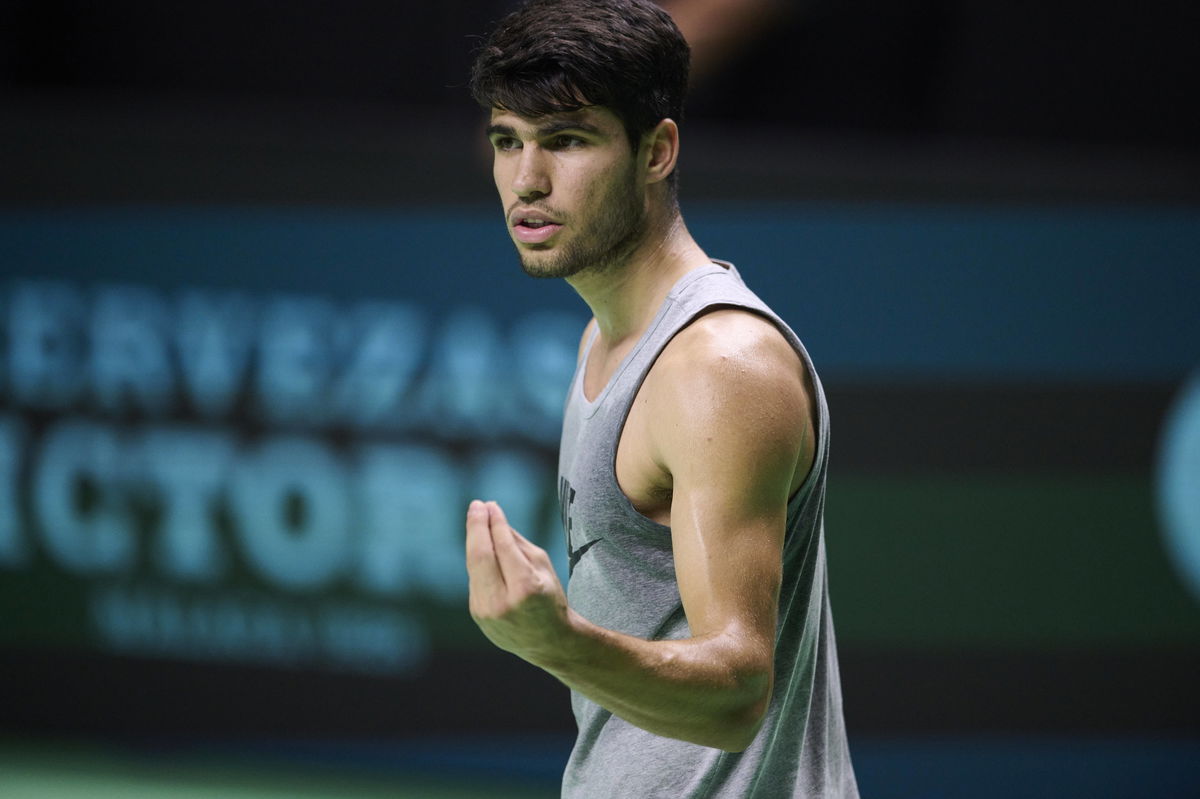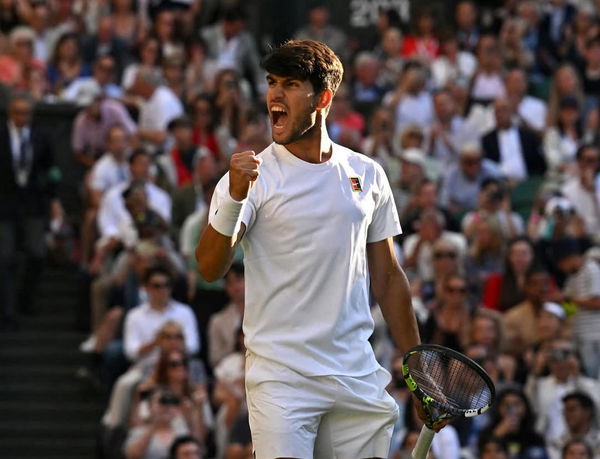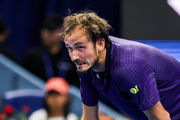
Imago
DAVIS CUP FINALS MALAGA – Training Session Spain MALAGA, SPAIN – NOVEMBER 18: Carlos Alcaraz of Team Spain looks on during a practise session prior to the 2024 Davis Cup Finals at Palacio de Deportes Jose Maria Martin Carpena on November 18, 2024 in Malaga, Spain. Photo by Francisco Macia/Photo Players Images/Magara Press Malaga Palacio Deportis Jose Maria Martin Carpena Spain Copyright: xFranciscoxMaciax

Imago
DAVIS CUP FINALS MALAGA – Training Session Spain MALAGA, SPAIN – NOVEMBER 18: Carlos Alcaraz of Team Spain looks on during a practise session prior to the 2024 Davis Cup Finals at Palacio de Deportes Jose Maria Martin Carpena on November 18, 2024 in Malaga, Spain. Photo by Francisco Macia/Photo Players Images/Magara Press Malaga Palacio Deportis Jose Maria Martin Carpena Spain Copyright: xFranciscoxMaciax
“Probably during the next few years gonna be even more tournaments, more mandatory tournaments. So, I mean, probably they are going to kill us in some way,” Carlos Alcaraz warned last year, and time has proven him right. From a Las Vegas showdown with Rafael Nadal to the Laver Cup, the Six Kings Slam in Saudi Arabia, and an exhibition with Frances Tiafoe, Madison Keys, and Sloane Stephens, his calendar has brimmed with commitments beyond the ATP grind. But this year, he seems to have found the balance, savoring precious family time between events, and as Cincinnati begins, he’s candid about the value of those breaks.
Watch What’s Trending Now!
Carlos Alcaraz, World No. 2 and second seed in Cincinnati, opened his campaign with a gritty 6-1, 2-6, 6-3 win over Damir Dzumhur on Sunday (August 10). After a blistering start, the match took an unexpected turn before the Spaniard steadied himself to secure victory. It also marked his long-awaited return to hard courts since his early Miami exit in March.
Kicking off his North American swing, Alcaraz carried with him the calm of three weeks spent at home with family after the Wimbledon final. That pause away from the relentless tour grind gave him fresh perspective, and he openly shared an honest admission about just how vital those breaks have become.
ADVERTISEMENT
Speaking to Tennis Channel after his opening win, Carlos Alcaraz’s face lit up when Prakash Amritraj asked about his time away from the court. “I love having time for me, for myself. If I had to be honest. Yeah, I always say that to you. That’s what you are working for as well, you know? I love playing tennis. I love when I step on the court, but sometimes it is too many days in a row, too many weeks in a row. So I just love to take my time off just with my family, with my friends, just at home doing nothing at all.”

Imago
Image Credits: Carlos Alcaraz/Instagram
For Alcaraz, these pauses aren’t a luxury; they’re a necessity. “And for me, it’s needful then to come back stronger and hungry to catch the racket and hit some balls. So for me, it has been a great, great day. You know, after it took, you know, my days in Ibiza, and then I came back stronger to the grass season title, making the final and then. Yeah, I had a week completely off,” he reflected.
ADVERTISEMENT
That Ibiza trip marked the start of a carefully carved window for recovery, one that stretched into more than just physical rest. “I went to the south of Spain, which was great. And then two weeks at home were unbelievable,” he continued, his words dripping with the satisfaction of recharging in familiar places.
And during that rare mid-season pause, the hunger returned. “You know, having three weeks, you know, between the, between the year in the middle of the year. For me, it was what should I do? I didn’t know, I didn’t know. So it was great. And I’m hungry for, for more in the American swing right now,” he concluded, eyes set firmly on the road ahead.
ADVERTISEMENT
Carlos Alcaraz calls the tennis calendar relentless, yet the Spaniard still carves out moments of joy. Even mid-season, Ibiza beckons. After conquering Jannik Sinner in a stunning French Open final, the 22-year-old escaped to the island’s sun-soaked shores, just as he had after past Roland Garros triumphs. Victory, for him, comes with both glory and the need to breathe.
But the drumbeat of discontent is louder than ever. On the ATP front, Alcaraz stands among the loudest critics of the punishing schedule. Daniil Medvedev has long voiced the same frustration, while world No. 4 Taylor Fritz recently branded the calendar insane. On the WTA side, Iga Swiatek and Elena Rybakina have raised alarms repeatedly, Rybakina even warning the WTA that more young stars could follow Ashleigh Barty’s early retirement.
Speaking to the Financial Times before Cincinnati, Alcaraz made his stance clear. “We’re trying to change the schedule a bit, seeing if they can remove more tournaments so we can have more rest time, more vacation time. It’s not easy, but we’re trying,” he said, his words as sharp as the forehands that break opponents.
ADVERTISEMENT
His call for reform came just after his post-Wimbledon downtime and before stepping back into the fray in Ohio, his first event since the All England Club. His return wasn’t smooth, falling to Sinner, but the fire in his tone suggested this was more than just a defeat; it was a statement. In the clash between a champion’s will and the sport’s ceaseless grind, Alcaraz isn’t just playing matches. He’s waging a fight for the very rhythm of tennis itself.
Carlos Alcaraz shares thoughts after Cincinnati opening victory
Three weeks away from the tour may sound refreshing, but for Carlos Alcaraz, returning to the grind is never as simple as it seems. The rhythms, the reflexes, the razor-sharp instincts, they all need time to resurface. History proves it at ATP Cincinnati, where last year he arrived drained from the Olympics, struggling to ignite his best tennis until a few matches in.
ADVERTISEMENT
This year, his opening act against Damir Dzumhur followed a familiar script. A sparkling start gave way to a dip in the second set, one best forgotten. Yet, when the third set demanded fire, Alcaraz answered, delivering bursts of brilliance that carved the path to victory. In those moments, the Spaniard’s relief was visible, almost tangible.
“It was a hard-fought win,” his body language seemed to say as he spoke to the same Tennis Channel post-match interview. For Alcaraz, it wasn’t just a result; it was oxygen. He had come off three weeks of rest, a much-needed pause that offered clarity as well as comfort. And in his words, he revealed the fine balance between battling through the rough patches and chasing that perfect groove.
Top Stories
Coco Gauff Admits Tour Life Was Lonely Before a Quiet Shift Changed Everything

“Tired of Hearing It”: Chris Evert Rushes to Coco Gauff’s Defense at Australian Open

Australian Open Star Collapses on Live TV as Extreme Heat Sparks Alarm

Jannik Sinner Draws Heavy Criticism After Controversial Australian Open Backstage Moment: “Most Hated Player”

Daniil Medvedev Speaks Out After Brutal Defeat Against Learner Tien in Melbourne: “Too Good for Me”

“I would say I need to be better, definitely,” he admitted. “I started the match very well, feeling the ball very nicely, but here, if you disconnect mentally, even for one, two, or three points, everything becomes even more complicated, it’s harder to come back. In general, I want to feel a lot better in my next match.”
ADVERTISEMENT
Looking ahead, his intent is fierce. “I would like to continue playing very aggressively. The conditions are very fast, so if you’re able to attack early, everything becomes much better. I would like to make my opponents suffer, keep feeling better. This tournament is fantastic, the people are great, I would like to play more matches here and continue feeling better day by day.”
Next in his path stands 22-year-old Serbian Hamad Medjedovic, young, hungry, and fearless. The question now hangs in the Cincinnati air: can Alcaraz turn momentum into mastery and march into the R16? The battle lines are drawn. The music is about to play again.
ADVERTISEMENT
ADVERTISEMENT
ADVERTISEMENT
ADVERTISEMENT
